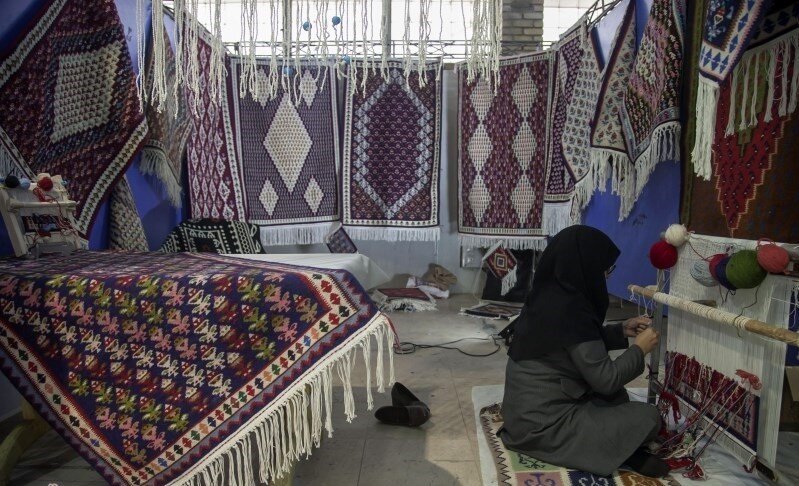National handicrafts exhibit inaugurated in Kermanshah

TEHRAN- An exhibition of Iranian handicrafts and traditional arts was inaugurated in Kermanshah on Tuesday.
The exhibit is showcasing traditional arts and crafts from 30 provinces across Iran, CHTN reported.
During the opening ceremony, Kermanshah province’s tourism chief Dariush Farmani stated that completing the value chain, promoting handicrafts, and supporting production are critical approaches we have adopted in the handicraft sector.
He added that due to the rich history of handicrafts in Kermanshah, the cities of Harsin in the field of kilim weaving, Dalahu in the tambourine craft, and Nodesheh in the production of traditional footwear of giveh, along with the village of Fash in Kangavar as a national village for traditional instrument making, have been registered as national cities and villages.
Farmani also highlighted their planning efforts to complete the value chain for several handicraft sectors in the province, noting that they have already begun necessary actions for enhancing the value chain of kilim weaving.
"Given the positive growth and the presence of distinguished artists in the fields of enamel work and woodcraft in the province, we are also prioritizing the completion of the value chain for these two sectors," he remarked.
He emphasized the activities undertaken in the area of handicraft education within the province, mentioning that over the past two years, free handicraft training has been provided to more than 500 individuals across Kermanshah.
Farmani noted the high enthusiasm for handicraft training in Kermanshah, adding that with the necessary funding, they can extend training sessions not only in urban areas but also in small towns and villages.
To ensure that the training provided to enthusiasts is practical, he explained that during the handicraft education, learners are also instructed in packaging, advertising, marketing, and sales by experienced instructors in the field.
Regarding support for handicraft production in the province, Farmani disclosed that last year, 480 billion rials ($800,000) in loans were allocated for home-based handicraft jobs, creating employment for approximately 480 individuals.
He further mentioned that there are currently around 1,000 more people seeking funding, and approximately 500 have been introduced to banks.
Emphasizing the identification of around 1,000 handicraft artists in Kermanshah over the past 18 months who need government support for social security insurance and bank loans, Farmani underscored the importance of this initiative.
The 14th Handicrafts and Traditional Arts Exhibition in Kermanshah features the participation of 220 handicraft artists from across the country and will come to an end on Friday.
Iranian handicrafts boast a rich history, deeply embedded in the country’s cultural and artistic heritage. From intricate Persian carpets and porcelains to decorative pottery, metalwork, and textile arts, Iranian crafts are renowned worldwide for their artistry and intricate designs. Each province carries its own distinct styles, materials, and techniques, reflecting the cultural and environmental diversity.
Currently, a selection of 13 cities and three villages in Iran have been registered by the World Council of Handicrafts as “world cities of handicrafts”.
Kermanshah, formerly Bakhtaran, the capital of Kermanshah province, was founded in the 4th century CE by Bahram IV of the Sasanian dynasty. Conquered by the Arabs in 640, the town was called Qirmasin (Qirmashin). Under the Seljuk rule in the 11th century, it was the chief town of Kordestan. The Safavids (ruled 1501–1736) fortified the town, and the Qajars repulsed an attack by the Turks during Fath Ali Shah’s rule (1797–1834). Occupied by the Turkish army in 1915 during World War I, it was evacuated in 1917. The construction of a road in the 1950s over the age-old Khorasan track added considerably to the importance of the city.
SAB/
Leave a Comment